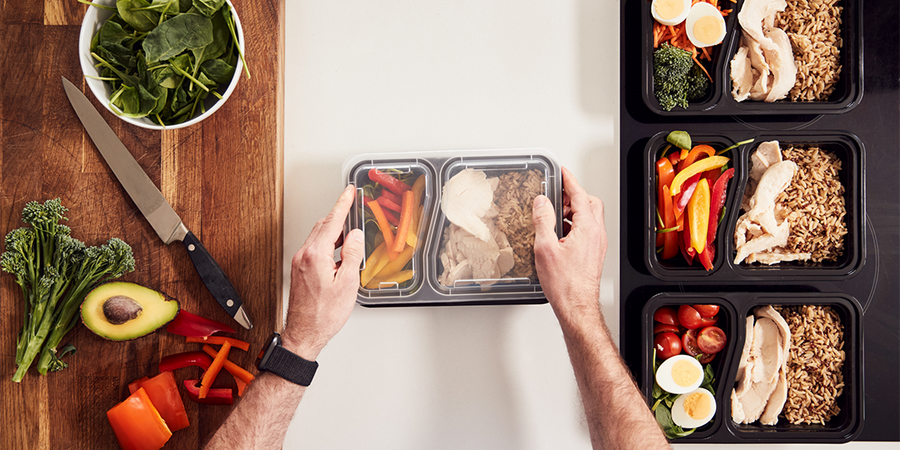
What is the Optimal Diet for Bodybuilding?
By Michael Martin
Bodybuilding — the art and science of packing on serious muscle — isn't simply about heaving heavy things. What you eat, when you eat, and how much you eat (or don't eat) matters. Thankfully, some simple guidelines can give you a solid foundation for bulking up while feeling as strong as you're trying to look.
Read on for some expert advice on the best diet for bodybuilding, the foods to eat and foods to avoid, and the optimal frequency and timing of meals and supplements.
Help your body build and repair muscles faster with LADDER Whey or Plant Protein.
.
How to Plan a Diet for Bodybuilding
Crafting your perfect meal plan for bodybuilding will require a bit of simple math and preparation.
Start with target weight and caloric intake

The optimal number of calories you should consume while bodybuilding depends on your goals. If you want to gain weight, you'll want to eat more calories than you expend every day. If you want to lose weight, you'll want to eat fewer calories than you expend. There are two ways to approximate your daily calorie expenditure.
One way is to calculate your basal metabolic rate (BMR) — the number of calories your body needs to support essential functions at rest. Everyone's BMR is different, based on factors like sex, age, and weight. You can find a BMR calculator here.
The other way is to multiply your current weight by a number depending on your activity level.
- Sedentary lifestyle (desk job): current weight in pounds x 11
- Moderately active lifestyle (occasional exercise): current weight in pounds x 12
- Highly active lifestyle (construction worker or elite athlete): current weight in pounds x 13
Once you figure out your maintenance calories, you can start to plan your meals and snacks.
Bodybuilding Food Basics
Here are some general guidelines for a bodybuilding diet.
1. Consume enough calories
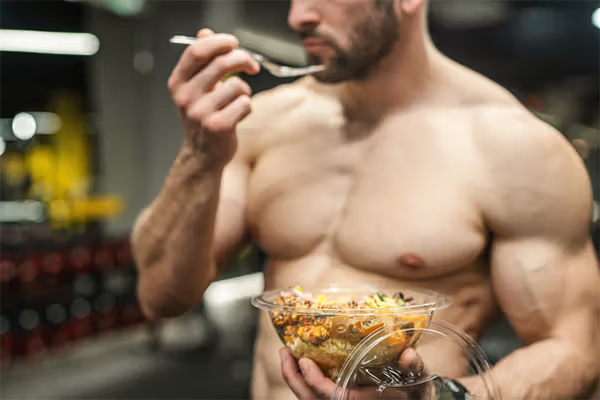
If you're looking to pack on muscle, make sure you're giving your body enough fuel to get the process started.
"For building muscle, the #1 most important thing is that you're getting enough calories in your diet," says Dana Ellis Hunnes, PhD, MPH, RD, senior clinical dietitian at UCLA Medical Center and author of Recipe for Survival. "Without enough calories, it really doesn't matter how much of anything else you are getting, or in what proportion — you will not gain muscle, and you will likely lose it."
2. Get enough protein
Protein is the building block of muscle, and it's the key nutrient for muscle growth. How much do you need?
For the average person who's looking to maintain overall health, at a minimum, it is recommended to consume at least 0.8 grams of protein per kilogram of body weight per day. For a 180 pound (82 kg) person, that's only 65 grams of protein.
If you're bodybuilding, you need more — but not an unlimited amount. To stimulate muscle growth, experts recommend getting 1.6 to 2.2 grams per kilogram of body weight in protein daily. For a 180-pound man, that's about 131 to 180 grams.
You may have heard about bodybuilders consuming far more than that. But anything above the 2.2 grams per kilogram max is believed to be oxidized for energy or transaminated to form alternative bodily compounds.
"More protein doesn't mean more muscle, especially if you're not getting enough calories overall," Hunnes says. And if you are getting adequate calories, your body may convert any excess protein you're consuming into fat.
However, as that study notes, "While research shows that consumption of higher protein doses (>20 g) results in greater AA [amino acid] oxidation, evidence indicates that this is not the fate for all the additional ingested AAs, as some are utilized for tissue-building purposes."
3. Hit the right macros
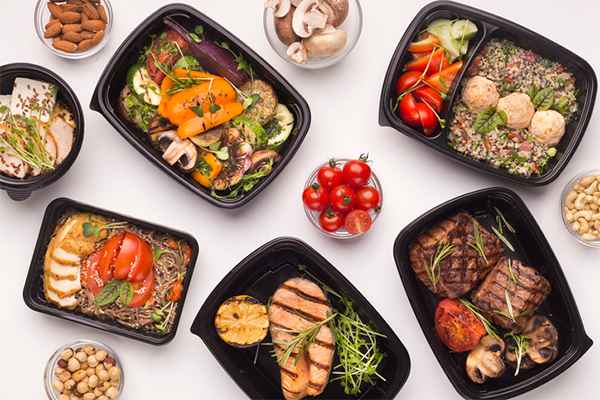
For building muscle, stick with a 40-30-30 balance. Aim to get roughly 30% of your calories as protein, 30% of calories as healthy fats (such as olive oil, nuts, and avocados), and 40% of your calories as carbohydrates.
4. Calculate for cutting vs. bulking
For bodybuilding, your daily calorie goals will vary depending on whether you're in a bulking phase or following a bodybuilding cutting diet. The exact amount an athlete needs will largely vary by individual.
The goal of the bulking phase is, simply, to put on muscle mass. During this phase, such as during the "off season," aim to consume 10% to 20% more calories.
Conversely, "when cutting, you're trying to lose fat and simply maintain muscle, so the goal is to take in just as many calories as you need to lose fat mass, but not muscle mass — and that can be hard to do," says Hunnes. Aim to lose no more than 1% of body weight per week, while maintaining protein intake to preserve muscle mass.
.
Best Foods to Eat for Bodybuilding
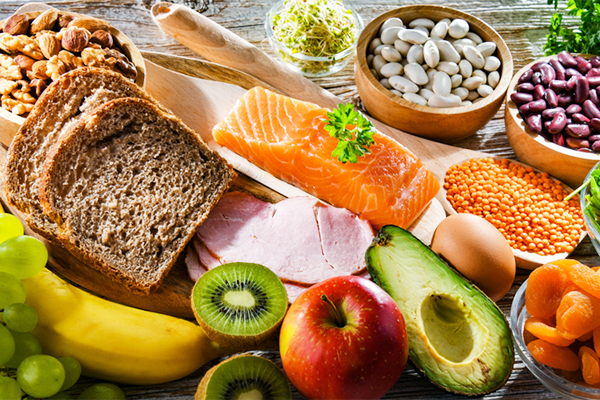
The best foods to eat while bodybuilding include:
- Just enough protein to hit at least 1.6 grams per kilogram of body weight
- Vegetables and fruits
- Whole grains, in moderation
- Nuts, seeds, and legumes (such as beans, peas and lentils)
Hunnes advocates a whole-food, plant-based diet and says it's possible to get enough protein for muscle building while eating a vegetarian diet. "If you really don't think you're getting enough, you can add a plant-based protein powder, whey protein powder, or eat eggs," she says.
If you eat meat, good sources of lean protein include chicken, fish like salmon or tuna, and lean meats like grass-fed beef.
.
Best Foods to Limit
You might think that "bulking season" is a free pass to eat whatever you want, but there are still some foods that you'll want to avoid.
Alcohol
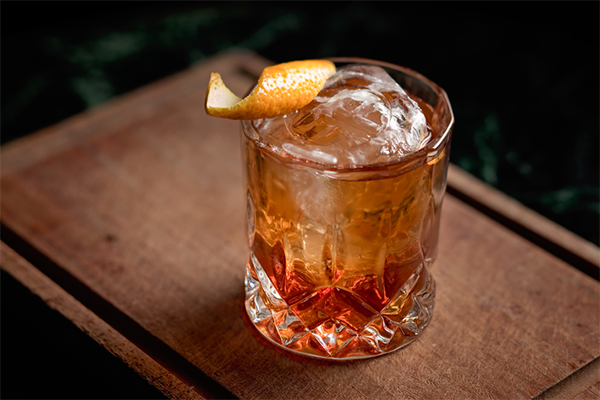
Booze is one of the first things you'll want to limit or eliminate. Not only is alcohol a source of empty calories — meaning they contribute no nutritional value — science has found that alcohol actively works against muscle building.
Research indicates that excess alcohol may impair muscle protein synthesis and may inhibit muscle recovery after exercise. But, if consumed after sport or exercise, a serving of approximately 0.5 grams per kilogram of body weight is unlikely to impact most aspects of recovery. It may therefore be recommended (if alcohol is to be consumed during this period).
Ultra-processed foods
These manufactured foods include prepackaged snacks, sugary cereals, soups, ready-to-eat meals, hot dogs, French fries, and store-bought sweets. They're another major underminer in your pursuit of the right kind of bulk. "Ultra-processed foods lead to inflammation in the body, which runs counter to building muscle," says Hunnes.
Sugars
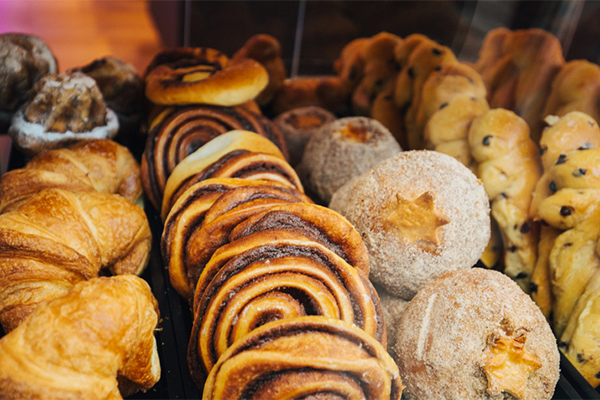
It's wise not to overconsume simple sugars when you're bodybuilding. While consuming sugar can cause a surge of insulin right after a workout — which can benefit muscle growth — eating too many simple sugars for too long can lead to insulin resistance, which can inhibit it. Foods that are high in simple sugars tend to be low in nutritional value; these empty calories can pack on fat, making any muscle growth harder to see.
High-fat foods
Healthy fats — such as olive oil, avocados, and nuts — are a key part of any healthy diet, especially for bodybuilding. What doesn't count: Deep-fried foods or foods high in saturated fat. That means fried chicken, french fries, tempura, calamari, pizza, doughnuts — you know the drill.
.
Timing of Meals and Supplements
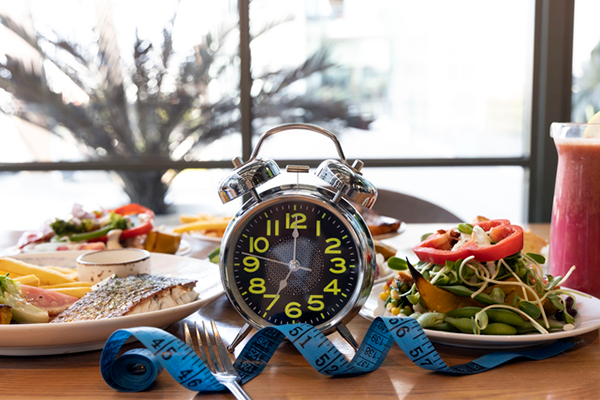
As for how often to eat meals and when, there's no magic number or equation. "The optimal frequency and timing of meals are whatever is right for that individual," says Hunnes. "If you like to eat three meals a day, that works — as long as you get enough calories and protein. If you prefer to snack, that works too! Remember the goal is to ensure you're getting enough calories and protein in your diet."
Aim to consume protein throughout the day (at each meal and snack) to optimize muscle protein synthesis. The anabolic window theory has largely been debunked, so we now know that the post-workout anabolic window lasts about four to six hours, not 30 minutes.
So how do these guidelines translate into a routine? Hunnes suggests this example meal plan for a day:
Breakfast
- Oatmeal with blueberries, peanuts, or almonds
- Egg or tofu scramble with avocado
Mid-morning snack
- 1 oz. trail mix, or walnuts with dates or raisins
Lunch
- Lean ground meat or black-bean burger on a whole-grain bun with avocado, lettuce, tomato, and onions
- Side of high-protein Greek or plant-based yogurt with chia seeds
Afternoon snack
- Jicama with hummus
Dinner
- Chicken or tofu enchiladas with pinto beans
- Side salad or grilled vegetables
Remember: Daily calorie needs vary depending on factors like sex, weight, and activity level. So vary your portion sizes accordingly. For example, "A woman might only need 1,500 to 2,000 calories daily, while a man might need 2,500 to 3,000 calories, depending on their activity level and goals," says Hunnes.



